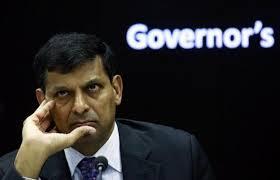 Strongly defending RBI's decision to hold the key rates in the absence of any new data points, Governor Raghuram Rajan on Wednesday said further rate reductions will depend on the quality of fiscal consolidation and how it aides the disinflationary process.
Strongly defending RBI's decision to hold the key rates in the absence of any new data points, Governor Raghuram Rajan on Wednesday said further rate reductions will depend on the quality of fiscal consolidation and how it aides the disinflationary process.
"Further action will be in the direction of the action (of a cut) that was initiated, and it will depend on the developments in particular on the fiscal front as well as continuation of the disinflationary process," Rajan told reporters at the customary post-policy interaction at RBI headquarters.
He indicated that the quality of fiscal consolidation, rather than the headline deficit number alone, will be important for him while undertaking any further cuts.
"It is not that we are locked to a specific number or a specific path, but it is the overall package, whether it makes for serious, high quality fiscal consolidation over time that clearly will impact the inflationary forces that we are most worried about. We will be looking at all aspects of the Budget and they are eagerly awaited," Rajan said.
He said he is confident that the government is focused on delivering a "solid Budget", adding that Finance Minister Arun Jaitley and his team have publicly affirmed their commitment to the ambitious 4.1 per cent fiscal deficit target for the current fiscal.
Having shifted to accommodative stance by surprising everyone with an off-meeting rate cut on January 15, Rajan reiterated that the way ahead is only to cut rates, but said the RBI needs more data to be able to do so.
The RBI Governor also hit out at the impatience of the markets and the industry, saying monetary policy is a long- drawn process where the central bank's actions take up to three quarters to have an impact on the ground.
"When we cut the interest rates it makes news for you, but it doesn't do anything for the economy for three quarters. We need to take into account the whole view, knowing that we are steering a ship which moves fairly slowly," Rajan said.
Apart from this, the RBI will also be looking at the third quarter GDP figures, due next Monday, he said.
The new change in the computation of GDP also calls for deeper analysis, he said.
The inflation-focused central bank will also look at emerging data on consumer price inflation, especially given the fact that there will be some re-basing in the numbers, he said.
Even though the rupee has appreciated against all other currencies except the greenback, leading some experts to believe that Rajan may cut rates to arrest its rise, Rajan said India's exports are not uncompetitive and the RBI is on vigil over the issue. "We are perfectly comfortable where the rupee is.
But it is a risk which we have to keep in mind going forward with the massive amounts of quantitative easing going on in the rest of world," he said, adding that RBI has intervened both ways in the market in recent weeks to curb volatility.
With central banks in the euro-zone, Japan, Singapore and other countries opting for stimulus, Rajan said the country is in a much better position to manage any event at the external front now be it the work done on growth, current account deficit, inflation, fiscal management and forex kitty -- which rose to a record high of USD 322 billion.
Other measures in the policy like a 0.50 per cent cut in the statutory liquidity ratio to 21.5 per cent are aimed at further stimulating growth or enhancing the stability of the system, Rajan said.
The move will release about Rs 42,000 crore into the financial system. Since Rajan took over, the RBI has slashed SLR by 2.5 per cent.
The decision to let foreign investors who have fully utilised their limits on investments in government securities, restricting their new investments to only top the coupon, is a "prudential measure" to incentivise long term flows, Rajan said, adding that RBI is not against foreign flows per se.
On the decision to replace the export credit refinance facility with auctions, Rajan said this is as per a suggestion from the monetary policy committee headed by Urijit Patel. Moreover, there was not much of activity in the window recently.
With banks not passing the past rate cut to borrowers, Rajan hoped that competitive pressures from other sources of funding like commercial papers will force lenders to reduce their rates, but explained RBI's inability to nudge lenders.
Commenting on the vexed issue of bad assets, he pointed out that banks have been allowed to increase their stake in a company to 30 per cent while restructuring, which will help even two lenders to come together and take management control of a company.
The RBI is in advanced stages of fixing a pricing formula with capital markets regulator Sebi to help banks take higher equity stakes, he said.
Rajan also hinted that the central bank will not allow for an extension to the April 1 deadline, which will end the era of asset restructuring, saying forbearance as a practice should end at the earliest.










